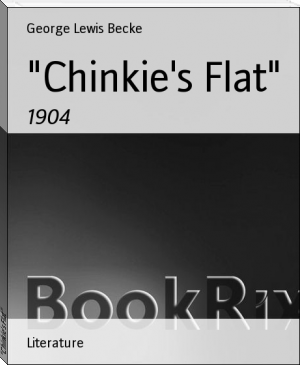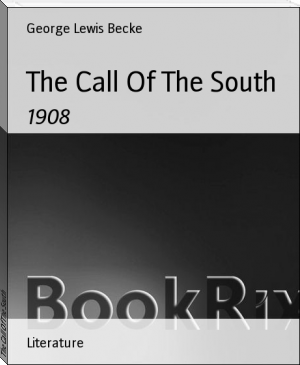"Chinkie's Flat" - George Lewis Becke (best fiction books of all time txt) 📗

- Author: George Lewis Becke
Book online «"Chinkie's Flat" - George Lewis Becke (best fiction books of all time txt) 📗». Author George Lewis Becke
"I have three or four more bottles left. I had a dozen from the doctor at Georgetown on the Etheridge River. He is a man who knows all about fever, and I can assure you that you will be a well man in ten days. Show me your hand, please."
The European extended his hand languidly to the Chinaman, who looked at the finger-nails for a moment or two: "You will have the 'shakes' in a few hours."
"Yes. They generally come on as soon as the sun gets pretty high--about nine or ten o'clock."
"Then you must take a dose now. Can I go inside and get a glass and some water?"
"Yes, certainly. It is very good of you to take so much trouble."
Returning with a glass and some water, the Chinaman poured out a dose of the mixture, and with a smile of satisfaction watched the sick man drink it.
Then Grainger and his visitor began to talk, at first on general matters such as the condition of the country between the Cloncurry and the Burdekin, and then about Chinkie's Flat, its past glories and its present condition. The frank, candid manner of Ah San evoked a similar freedom of speech from the Englishman, who recognised that he was talking to an intelligent and astute man who knew more about the Far North of Queensland and its gold-fields than he did himself.
Then Ah San saw the opportunity for which he had been waiting, and drawing his seat nearer to Grainger's he spoke earnestly to him, told him exactly of the situation of himself and his company, and ended up by making him a certain proposition regarding the working of the abandoned claims, and the restarting of the rusting and weather-worn "Ever Victorious" battery.
Grainger listened intently, nodding his head now and then as Ah San emphasised some particular point. At the end of an hour's conversation they heard the cracking of the landlord's stock whip and the bellowing of cattle as they crossed the creek, and the Chinaman rose and held out his hand.
"Then good morning, Mr. Grainger. I hope you will be able to convince your mates that we can all pull together."
"I am sure of it. We are all pretty hard up. And you and your men can help us, and we can help you. Come down again to-night, and I'll tell you the result of my talk with them."
CHAPTER V ~ THE RESURRECTION OF THE "EVER VICTORIOUS"
At six o'clock in the evening, Grainger was seated at one end of the rough dining-table in the "Digger's Best" with some papers laid before him, At the other end was Dick Scott, and the rest of the men sat on either side, smoking their pipes, and wondering what was in the wind.
Grainger did not keep them waiting long. Taking his pipe ont of his month, and laying it on the table, he went into business at once, He spoke to them as if he were one of themselves, adopting a simplicity of language and manner that he knew would appeal to their common sense and judgment far more than an elaborately prepared speech.
"Now, boys, I've got something to say, and I'll say it as quick as I can. None of you know anything of me beyond what I have told you myself; but I don't think any one of you will imagine I'm a man who would try to ring in a swindle on you when I bought the old rattletrap down there?"
"Go ahead, mister," said Dick Scott, "we didn't think no such thing. We on'y thought you was chuckin' away your money pernicious."
Grainger laughed so heartily that his hearers followed suit Then he went on--
"No. I'm not throwing my money away, boys. I am going to _make_ money on this field, and so are you. But there are not enough of us. We want more men--wages' men; and presently I'll explain _why_ we shall want them. But first of all, let me show you what I obtained the other day out of between 200 and 250 lbs. weight of those tailings."
He rose, went into the second room, and returned with a small enamelled dish, and placed it upon the table. The miners rose and gathered round, and saw lying on the bottom about an ounce and a quarter of fine powdery gold.
"Holy Moses!" cried one of them, as he drew his forefinger through the bright, yellow dust, "there's more than an ounce there."
"There is," affirmed Grainger: "there are twenty-five pennyweights, and all that came out of not more than 250 lbs. of tailings!"
The men looked at each other with eyes sparkling with excitement, and then Grainger poured the gold out upon a clean plate for closer examination.
"Why," exclaimed Scott, "that means those tailings would go ten ounces to the ton!"
"Just so," said Grainger, "but we can't get those ten ounces out of them by ordinary means, though with new screens, new tables and blankets I am pretty sure we can get four ounces to the ton. But we want the ten, don't we?"
"You bet," was the unanimous response.
"Well, I'll guarantee that we shall get eight ounces at least. But first of all I'll tell you how I got the result. You can try some of the stuff in the morning, and you will find that those tailings will pan out about eight or ten ounces to the ton."
"But acid is mighty dear stuff," said Scott.
"Just so, but it is very good as a test, and of course we are not such duffers as to try to treat more than a couple of thousand tons of tailings with acid. We'd die of old age before we finished. Now, I'll get on and tell you what I do propose. You remember that I said I had seen tailings treated in Victoria without roasting. Well, we could do that now, though we should only get half the gold and lose the other half in the sludge pits. Now, as I told you, I have about four hundred pounds' worth of alluvial gold, which I brought with me from the north, and which I can sell to any bank in the Bay. I intended when I bought the 'Ever Victorious' to spend this L400 in buying some fine screens, a couple of grinding pans, and some other gold-saving machinery, so that when I was not crushing stone for you men I could be running those tailings through. But we can do better--now that the Chinamen are here."
Something like dismay was depicted on the men's faces when they heard this, but no one interrupted as he went on--
"We can do much better. Instead of treating those tailings by simply running them through the screens again and losing half the gold, we can build a proper roasting farnaoe, and _then_ we can grind them, keeping the stampers for crushing alone. This morning I had a long yarn with Ah San, the boss Chinaman, and he is willing to let us have as many of his men as we want for twenty-five shillings a week each, and indenture them to me for six months--there's the labour we want, right to our hand. It's cheap labour, I admit, but that is no concern of ours. The Chows, so Ah San tells me, will be only too glad to get a six months' job at twenty-five bob a week--of which he takes half."
"Aye," said Scott contemptuously, "they're only bloomin' slaves."
"To their boss, no doubt; but not to us. They will be well pleased to work for us and earn what they consider good wages. I propose that we get at least twenty of them and set them to work right away. There is any amount of good clay here, I know, and we'll start them digging. I know how to build a brick-kiln, and we'll get a proper bricklayer up from the Bay, and I guarantee that by the time the new machinery is up that the roasting furnace will be built."
"No need to get a bricklayer from the Bay and pay him about eight pound a week," said a man named Arthur O'Hare; "I'm a bricklayer by trade."
"Bully for you," said Grainger; "will you take four pounds a week to put up the furnace and chimney?"
"I'm willing, if my mates are."
"Well, boys, that's pretty well all I have to say. We'll build the roasting furnace; the Chinamen will do all the bullocking{*} both at that and the battery, and we'll put on half-a-dozen to help at the new shaft. I'll boss the battery, drive the engine, and do the amalgamating, and you men can go on roasting stone. Every Saturday we'll stop the battery and clean her up, and at the end of every four weeks we'll send the gold to the bank and go shares in the plunder. Now, tell me, what do you think? Do you think it's a fair proposition?"
* "Bullocking"--hard work--i.e., to work like bullook. In a
team.
After a very brief consultation together, Scott, speaking on behalf of his mates, said they were all willing, and not only willing, but pleased to "come in" with him, but they thought that he would only be acting fairly to himself if he, as manager of the battery, amalgamator, and general supervisor of the whole concern, took a salary of ten pounds a week.
"No, boys. I'll take six pounds if you like. Of course, however, you will not object to refunding me the money I am expending on the new machinery. As for the profits, we shall divide equally.
"Well then," said Scott, banging his brawny fist on the table and turning to his mates, "if you treats us in that generous way, we must do the same with you as regards the stone we raise. Boys, I proposes that as our new mate is finding the money to start the old battery again, and going even shares with us in the gold from the tailings, that we go even shares with him in whatever gold we get from the claims."
"Right," was the unanimous response. And then they all came up one by one and shook hands with Grainger, whose face flushed with pleasure. Then Jansan produced a bottle of rum and Grainger gave them a toast--
"Boys, here's good luck to us all, and here's to the day when we shall hear the stampers banging away in the boxes and the 'Ever Victorious' be as victorious as she was in the good old days of the field."
CHAPTER VI ~ "MAGNETIC VILLA"
"Magnetic Villa" was one of the "best" houses in the rising city of Townsville. It stood on the red, rocky, and treeless side of Melton Hill, overlooked the waters of Cleveland Bay, and faced the rather picturesque-looking island from whence it derived its name.
About ten months after the resurrection of the "Ever Victorious" and the concomitant reawakening to life of Chinkie's Flat, three ladies arrived by steamer from Sydney to take possession of the villa--then untenanted. In a few hours it was generally known that the newcomers were Mrs. Trappeme, Miss Trappeme, and Miss Lilla Trappeme. There was also a Master Trappeme, a lanky, ill-looking, spotted-faced youth of fourteen, in exceedingly new and badly-fitting clothes much too large for him. By his mother and sisters he was addressed





Comments (0)